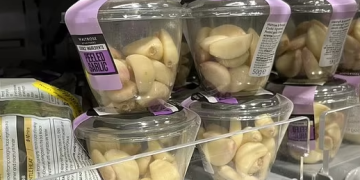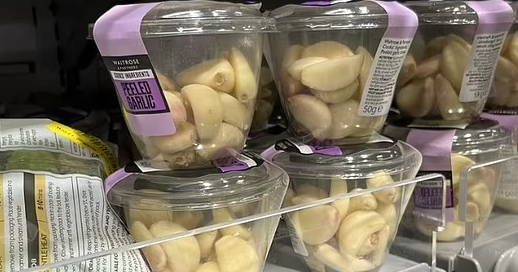#PeelingGarlicDebate, #WaitrosePlasticPots, #PrePeeledGarlic, #EnvironmentalImpact, #PlasticPackaging, #SustainableAlternatives, #AccessibilityInKitchen, #ArthritisSupport, #DifferentlyAbledIndependence, #EnvironmentalConsequences, #GarlicProducts
A recent tweet by Sarah Duggers from London sparked a heated debate among shoppers after she shared a picture of peeled garlic packaged in plastic pots on sale at Waitrose. The post garnered significant attention, with some criticizing the use of plastic packaging for a product that can easily be sold without it, while others defended it as a helpful solution for individuals with fine motor skill problems or arthritis. This article delves into the development of this divisive product and explores the consequences of such choices on the environment and differently-abled individuals.
Waitrose, a popular supermarket chain, introduced a product that left many shoppers divided – peeled garlic in individual plastic pots. Traditionally, garlic is sold as whole bulbs or loose cloves, allowing customers to choose and use as needed. However, the new offering of pre-peeled garlic came in plastic packaging, raising concerns about its necessity and environmental impact.
The rationale behind this development might be well-intentioned, as it aims to provide convenience to shoppers who may have difficulties peeling garlic due to limited dexterity or mobility challenges caused by disabilities or conditions like arthritis. For such individuals, the pre-peeled cloves might indeed be a helpful solution, enabling them to maintain their independence in the kitchen.
The introduction of pre-peeled garlic in plastic pots, while potentially beneficial for some, raises significant environmental concerns. Plastic packaging has long been criticized for its negative impact on the planet. The excessive use of single-use plastic contributes to pollution, harm to wildlife, and an ever-growing burden on landfills and oceans.
Environmentalists argue that alternatives to plastic packaging, such as reusable containers or other sustainable materials, could be explored to cater to the needs of individuals with fine motor skill problems without further damaging the environment. Furthermore, some shoppers question the necessity of such packaging when other garlic products, like pre-chopped or pureed garlic, already exist on the market, offering similar convenience without the excessive plastic waste.
The controversy surrounding the sale of peeled garlic in ‘unnecessary’ plastic pots at Waitrose highlights the complex balance between convenience for differently-abled individuals and environmental responsibility. While some customers appreciate the practicality it offers, others emphasize the importance of exploring eco-friendly alternatives. As conversations like these continue, it becomes crucial for businesses and consumers alike to consider the long-term impact of their choices on both society and the environment. Only through a thoughtful and collaborative approach can we strike a balance that ensures accessibility without compromising the health of our planet.































